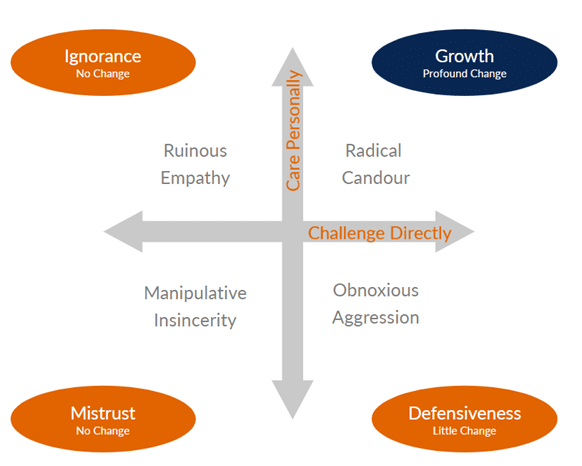Need some practical steps for implementing radical candour in your organisation? Read on!
By now you’ll be familiar with Kim Scott’s concept of radical candour which encourages leaders to care personally and challenge directly to create a workplace where feedback fuels growth. Check our radical candour overview here if not, and also see how different DiSC behavioural styles tend to interpret the concept differently and how to approach that with your people.

Remember the sweet spot is the top-right quadrant – you’re balancing ‘caring personally’ (seeing team members as whole individuals; showing genuine interest in their well-being and development) with ‘challenging directly’ (clearly and honestly communicating issues/concerns; being transparent and straightforward and not sugar-coating).
So let’s now look at how you can overcome the barriers to achieving this sweet spot of radical candour.
Overcoming Barriers with Candour
The Pitfalls of Ruinous Empathy
We’re often encouraged to be kind, mindful of mental health, and supportive in avoiding burnout. This caring approach is essential in any workplace. However, being overly empathetic to others’ needs can unintentionally become unhelpful, leading to what’s known as ruinous empathy.
Ruinous empathy may stem from good intentions, but it can lead to significant issues within an organisation.
When leaders actively avoid giving constructive feedback to spare someone’s feelings, they inadvertently create an environment where mediocrity is tolerated. Opportunities for growth are missed. This misguided kindness prevents individuals from understanding their areas of improvement and can lead to complacency. More worryingly, it can result in the buildup of unresolved issues that may later explode, causing greater damage than if addressed directly in the first place.
If this resonates, there are a few things you can do to encourage change:
- Encourage open dialogue by creating safe spaces for honest conversations
- Provide both praise and constructive criticism to your leaders to model the approach
- Encourage continuous learning and development to keep your leaders open-minded
Ruinous empathy can also undermine respect and trust in leadership, as team members often recognise when they are not being pushed to their full potential.
To avoid these pitfalls, leaders must understand that true kindness often lies in helping team members face and overcome their challenges. But it is often too easy not to push past our own barriers…
From Comfort Zones to Growth Zones
Moving from comfort zones to growth zones requires a shift in mindset, for example, from avoiding difficult conversations to embracing them as opportunities.
When leaders practice radical candour, they encourage their team members to step out of their comfort zones, where learning and innovation are limited, and into spaces where they can truly develop.
This transition is not just about pushing for higher performance but also about nurturing a mindset that values continuous improvement. It involves setting challenges that stretch abilities and expand skill sets.
Leaders play a crucial role in this process by creating an environment that rewards taking risks and learning from failures. By doing so, they help build resilience and adaptability within their teams. This is why we often teach participants in our leadership development programmes how to use radical candour with their own teams.
When individuals are supported in pushing past their barriers, the entire organisation moves forward, evolving into a more robust and adaptable entity.

Implementing Radical Candour in Your Team
1. Encouraging Open Dialogue and Feedback
Creating a culture where open dialogue and feedback are the norms is essential for implementing radical candour.
It might sound like an obvious statement but it’s critical to establish trust and make it clear that feedback is a two-way street. You may find that those most in need of support here are recently promoted leaders, for example a salesperson promoted to a sales manager from within the internal team.
Leaders should encourage team members to speak up and share their thoughts and concerns without fear of negative repercussions. This openness allows for a richer exchange of ideas and fosters a sense of collective responsibility for the team’s success.
Regularly scheduled feedback sessions, as well as impromptu check-ins, can help maintain this flow of communication. When feedback is seen as a gift rather than a critique, it empowers individuals to improve and innovate.
Leaders must also be receptive to feedback on their performance, demonstrating that growth and learning are expected at all levels of the organisation.
2. Building a Culture of Continuous Development
To truly embed radical candour within a team in the implementation stage, it is essential to build a culture of continuous development.
This means learning and growth are not only encouraged but are also seen as integral to everyday work. Leaders should highlight the value of ongoing development and provide opportunities for team members to acquire new skills and knowledge.
By encouraging open dialogue, providing regular feedback, leading by example, and creating a growth mindset, organisations can pave the way for a more constructive and progressive workplace, where personal barriers give way to individual and collective advancement.
You might use training programmes, mentorship, and stretch assignments that challenge individuals to go beyond their current capabilities in order to achieve this.
It’s important to remember that there’s no silver bullet. People need to actually experience the benefits of radical candour themselves first, in order to buy into its benefits. They need to have that epiphany that only happens if they are pushed to try something new.
Finally, recognising and celebrating progress and achievements reinforces the importance of personal and professional growth. When continuous development is part of the fabric of a team, it not only benefits the individuals but also contributes to the organisation’s ability to adapt and thrive in an ever-changing business landscape.
To conclude…
Radical candour isn’t just a concept. It’s a transformative leadership approach that can create a culture of trust, growth, and accountability. If you’re considering introducing radical candour, this powerful framework, to your team, here are some questions to guide your next steps:
- Are your leaders equipped to balance caring personally with challenging directly?
- Do your teams understand how different DiSC behavioural styles influence feedback delivery and reception?
- Could your organisation benefit from a culture where feedback is not feared but embraced as a growth opportunity?
We design bespoke radical candour modules tailored to your leaders’ unique needs and challenges. Let’s work together to empower your leaders to create high-performing, growth-oriented teams.
Schedule a free consultation with us. We’ll be happy to discuss how we can leverage our experience to help your organisation and your people thrive.



